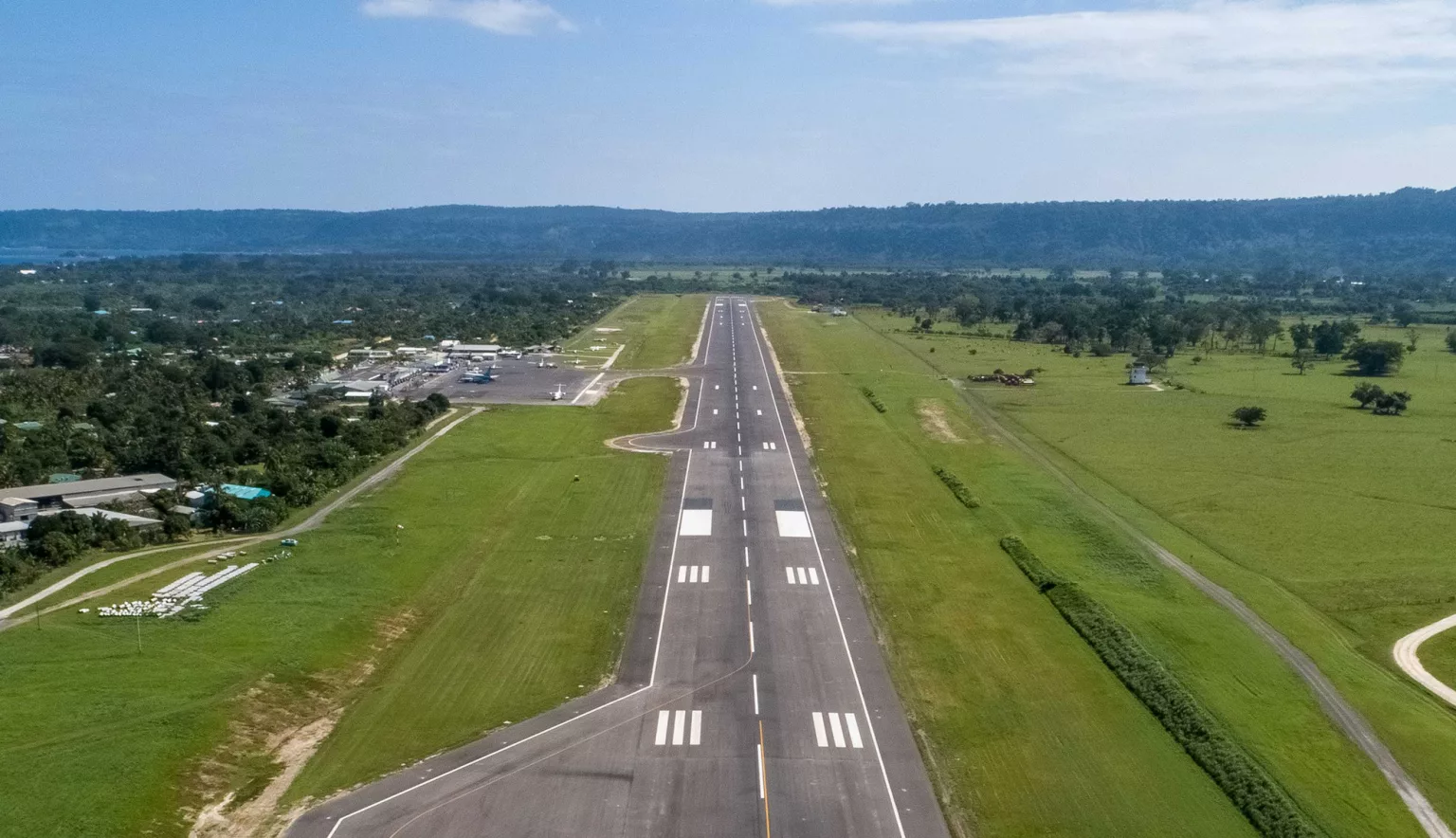Despite the obvious challenges posed by COVID-19, Airports Vanuatu Limited has been able to make progress on a number of developments and landmark projects.
PARADISE PUSHED TO THE LIMIT
An economy reliant on tourism, the islands of Vanuatu have had to adjust to the economic downturn caused by the major obstacle facing the world in 2020 – COVID-19.
Vanuatu, despite its remoteness off of the Australian coast, has felt the shockwaves created by the coronavirus pandemic in 2020.
The volcanic archipelago nation is made of six provinces and 83 individual islands home to tropical conditions, white beaches, clear sheltered waters, and coral reefs, some of which harbour wartime US shipwrecks. It has, up to this past year, been a distant yet popular destination for holiday goers and scuba divers around the globe.
With no written history pre-colonialisation the islands’ prehistory remain rather obscure. Claimed by the Spanish during the colonial era, the largest of Vanuatu’s islands was renamed Espiritu Santo; a name that has survived to this day. Yet it was much later with the coming of the Second World War that the archipelago changed drastically.
Australia had already stationed forces on one of the many islands to protect the mainland from a possible Japanese invasion, and after the Japanese attack on Pearl Harbour, the US made use of the archipelago to station soldiers, ships, and military planes in newly built airports as a military buffer against potential Japanese forces.
One of these airports, built on Santo, remains in the present as one of the three used by Airports Vanuatu Limited (AVL), founded in 2000 as a government entity. Its other airports are based on the island of Tanna, and the nation’s capital Port Vila.
Airports Vanuatu, with its 250-strong team, provides flight services to and from Vanuatu to a number of closer locations, including New Caledonia, Fiji, and the Solomon Islands, to those further afield such as Australia, and New Zealand.
As a secluded island chain, Vanuatu relies heavily on tourism as its primary industry. The tourism industry had made up 40-60 percent of the nation’s economy and so formed the spine of economic strength for the archipelago, prior to the outbreak of COVID-19.
Indeed, in the 12 months ending February 2020, prior to COVID-19 and border closures, Airports Vanuatu achieved a record throughput of 776,000 passenger movements, up eight percent on the previous period.
“The COVID-19 pandemic has had a significant impact on our nation,” comments CEO Jason Rakau. “Vanuatu is one of the few countries in the world to be COVID-free, which is a blessing.
“However, following the closure of our borders in March and the declaration of a State of Emergency, our aviation industry has been impacted significantly and our international tourism industry has been decimated. For AVL, overall passenger traffic for the September quarter is down 74 percent on a year ago.
“As we are COVID-free, domestic flying recommenced relatively quickly, in April. Domestic passenger movements for the September quarter are down 53 percent on a year ago. International air travel continues to operate in a limited capacity under the direction of the National Disaster Management Office to enable humanitarian relief, repatriation and cargo flights. Just over 3,000 international passengers travelled during the September quarter, 97 percent down on a year ago.”
This has resulted in an understandable scaling back of operations across the three airports, with all employees working reduced hours and a number of capital projects put on hold.
However, the CEO is determined to kickstart air services to and from the nation once again.
“AVL has taken a leadership role in re-establishing air services to our nation, working alongside multiple stakeholders in the policy and commercial space, to develop the regulatory and health protocols for safe travel as well as bilateral negotiations with other countries to enter into our ‘Tamtam Bubble’.
“As an island nation our number one objective is to ensure essential air services are maintained. Further, we are mindful that as a developing nation we must prioritise the health of our residents and be vigilant to ensure the best COVID-safe practices are implemented, as we consider welcoming back international visitors and recommencing sustainable tourism.”
BUILDING FOR THE FUTURE
Indeed, despite the obvious challenges Airports Vanuatu Limited has been able to make progress on a number of developments and landmark projects.
At Port Vila, it has upgraded airport pavement (runway, taxiway, and apron) and airfield lighting infrastructure, a move which will allow it welcome wide-bodied jet aircraft in accordance with ICAO standards. It is game changer for the country, which now has the potential to directly access new travel and trade markets such as Asia and North America.
Port Vila also has a new terminal precinct project on the cards, the largest element of a new masterplan which aims to secure the long-term future of the site.
“We recently completed airport masterplans for all three airports, detailing major infrastructure developments to be delivered over the next 20 years to safely accommodate anticipated demand for air travel based on our vision for growth at each,” Rakau adds.
“Our next highly anticipated major infrastructure upgrade currently in progress involves the upgrades of air navigational aids across our three airports. COVID-19 has caused some delays in delivery of this important project due to our inability to get technical specialist teams into the country as a result of border closures. However, we anticipate moving ahead very soon as arrangements are being finalised now to allow such teams to enter the country as part of the essential air services needed.”
Cooperation with the wider industry in the form of numerous partnerships is also an ongoing priority.
Rakau highlights the Air Transportation and Tourism Taskforce, made up of AVL, national airline Air Vanuatu and the Vanuatu Tourism Office, with the aim of stimulating growth in air transport and tourism throughout the next decade through heightened cooperation.
“Our gateway airport runway upgrades have been completed, Air Vanuatu has placed an order for a new efficient aircraft fleet with the first aircraft due for delivery soon, and the Vanuatu Tourism Office has launched a new destination brand for Vanuatu which has been very successful so far,” the CEO explains, who also states how important collaboration is up and down AVL’s own supply chain.
“For me, establishing a relationship which consists of mutual trust is the key. We need to be confident that our suppliers always have Airports Vanuatu’s best interest at heart when delivering their products or services. Given the very limited resources available to any small island developing state airport operator, we need to be confident that we are getting good value for our investment.
“Many of our current suppliers have continued to work closely with us on various aspects of improving the organisation because they have continued to deliver quality results and proven themselves to be a trustworthy partner.”
Such partnerships and sense of togetherness will be vital in ensuring AVL and Vanuatu’s air sector emerges strongly from the COVID-19 fallout over the next year.
Rakau ends the conversation in an upbeat manner, confident that visitors will once again be drawn to the beautiful paradise as more progress is made in combating the virus around the world.
“As a COVID-free nation, Vanuatu has every reason to be optimistic about the future growth of air travel,” he says. “Maintaining essential air services to enable movement of goods and people is our starting point and from there we plan to develop bubbles with our core markets for quarantine-free travel, as protocols can be agreed on a bilateral basis with each country.
“We entered the decade with a new vision that very much still applies – this is to build a sustainable hub in the South Pacific, to be the pride of Vanuatu, and to enable people to connect.”






















